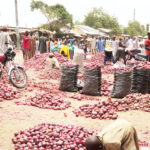Despite the suppression of economic activities endured by Nigerians due to the scarcity of the redesigned naira notes, the nation’s inflation rate rose in February to 21.91 per cent, posing questions on whether the cashless policy introduced by the government achieved its goals.
The inflation hike dwarfed the 21.82 per cent recorded in January, the National Bureau of Statistics announced yesterday.
The statistics office said the February inflation rate showed an increase of 0.09 per cent points when compared to January’s headline inflation rate.
The recent spike is coming on the heels of an unprecedented cash crunch as a result of the naira redesign policy of the Central Bank of Nigeria (CBN).
- Elections: Police redeploy 5 CPs in Kano in 1 week
- El-Kanemi Warriors escaping relegation still possible, says coach Abara
CBN Governor Godwin Emefiele had repeatedly disclosed that the new cash withdrawal limit policy had moderated inflation.
He also said it will help in stabilizing exchange rate, strengthen the naira, support activities of security agencies and reduce incidences of ransom taking in the country.
Emefiele also repeated the assurance during the fact-finding interactive session held at the instance of the House of Representatives Ad hoc Committee on the review of the CBN cashless policy and extension of the timeframe of the currency swap programme.
Experts who spoke to Daily Trust yesterday said they were not surprised by the hike in inflation considering that the naira redesign policy and demonetization were not managed in such a way as to benefit Nigerians and the economy at large.
They said the claims by the CBN and the federal government that inflation had gone down as evident in the reduction of some perishable food items was indeed a setback for farmers who brought down the prices because there were no buyers.
What the NBS said
In its inflation report on Wednesday, NBS said increases were recorded in all Individual Consumption by Purpose (COICOP) divisions that yielded the headline index.
“Similarly, on a year-on-year basis, the headline inflation rate was 6.21 per cent points higher compared to the rate recorded in February 2022, which was 15.70 per cent.
“This shows that the headline inflation rate (year-on-year basis) increased in February 2023 when compared to the same month in the preceding year (February 2022),” the NBS said.
The report noted that the contributions of items on a class basis to the increase in the headline index were bread and cereal (21.67 per cent), actual and imputed rent (7.74 per cent), potatoes, yam and other tubers (6.06 per cent), vegetables (5.44 per cent) and meat (4.78 per cent).
Food inflation surges to 24.35%
According to the bureau, the food inflation rate in February 2023 was 24.35 per cent on a year-on-year basis — representing a 7.24 per cent points increase compared to the 17.11 per cent recorded in February 2022.
It said the rise in food inflation was caused by increases in prices of oil and fat, bread and cereals, potatoes, yam and other tubers, fish, fruits, meat, vegetables and food product.
Kwara, Imo, Lagos residents paid more for food in February
The release by NBS showed that Kwara, Imo and Lagos residents paid more for food in the period under review.
“On a month-on-month basis, the food inflation rate in February 2023 was 1.90 per cent, indicating a 0.18 per cent points decrease compared to the rate recorded in January 2023 (2.08 per cent),” the report reads.
“The average annual rate of food inflation for the 12 months ending February 2023 over the previous 12-month average was 22.12 per cent, which was a 2.44 per cent points increase from the average annual rate of change recorded in February 2022 (19.69 per cent).
“In February 2023, food inflation on a year-on-year basis was highest in Kwara (29.51 per cent), Imo (27.47 per cent), and Lagos (27.42 per cent); while Sokoto (18.54 per cent), Jigawa (19.67 per cent), and Yobe (21.89 per cent) recorded the slowest rise.
“On a month-on-month basis, however, February 2023 food inflation was highest in Yobe (3.15 per cent), Edo (3.03 per cent), and Ogun (2.90 per cent); while Rivers (0.75 per cent), Sokoto (0.89 per cent), and Nasarawa (0.90 per cent) recorded the lowest.”
Naira redesign will contract Nigeria’s GDP by N10trn in Q1 2023 – Yemi Kale
Oyeyemi Kale, former statistician-general of the federation, said Nigeria’s gross domestic product (GDP) would contract in the first quarter (Q1) of 2023, due to the naira redesign policy.
In a series of tweets, Kale, who is now chief economist at KPMG Nigeria, projected that the country’s GDP would reduce by about N10 trillion to N15 trillion due to the CBN currency redesign policy which led to a nationwide cash scarcity.
The economist, who also served as the CEO of the National Bureau of Statistics (NBS) from 2011 to 2021, said this would affect Nigeria’s total GDP which stood at N198 trillion in 2022, as most sectors are cash-based.
“This is because about 40 per cent of Nigeria’s N198 trillion GDP in 2022 is informal of which about 90 per cent is cash-based. Further, 30 per cent of formal sector GDP is cash-based. This means N106.9 trillion of the total too is cash-based.
“There is nothing new or wrong about currency redesign or cashless policy if done for the right reasons and at the right time. But every policy will have pros and cons and will benefit some but not others. There is no policy that won’t affect someone negatively. Or that won’t have costs.
“Of the 46 economic activities, agriculture, some manufacturing activities (especially food and beverage, textiles, apparels), trade, arts, entertainment and recreation, accommodation and food services, road and water transport and other services are expected to be the most affected.
Using cash scarcity to stifle demand is not sustainable – Expert
Speaking with the Daily Trust on the rise of inflation despite the cash crunch during the period, a financial analyst, Prof. Uche Uwaleke, said the use of cash scarcity to stifle demand is not a sustainable way to tackle inflation as it hurts economic growth and could lead to loss of jobs thereby fuelling unemployment.
“The rise may not be unconnected with the cash scarcity which resulted in low demand for goods and services in view of the cash-based nature of the Nigerian economy.
“But on a month-on-month basis, the inflation rate, according to the NBS, actually dropped. That is, compared to the month of January, this month, the economy witnessed a slight downward pressure in the general prices of commodities.”
Also speaking on the inflation figures, another economist, Dr Isah Abdullahi of the Federal University Kashere said: “We have a problem with productivity. Almost everything is being imported and that has also impacted the number of jobs available for our youth.”

 Join Daily Trust WhatsApp Community For Quick Access To News and Happenings Around You.
Join Daily Trust WhatsApp Community For Quick Access To News and Happenings Around You.


